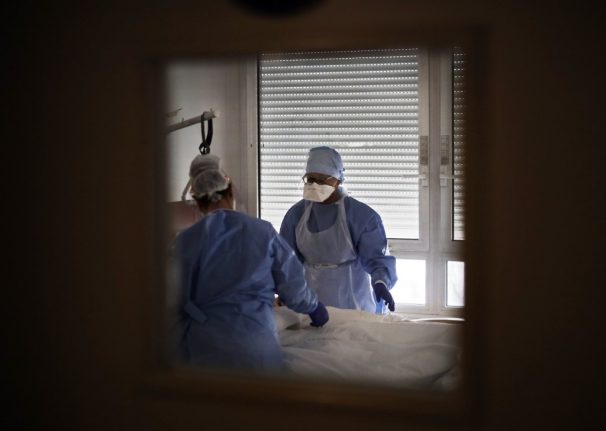Director General of Health Jérôme Salomon said in the past 24 hours there were 82 fewer coronavirus patients in intensive care than the previous day – the first time that a fall in the overall number has been observed.
In the last 24 hours 424 people died, bringing the total number of deaths in hospitals and care homes to 12,210.
In total there were 7,066 coronavirus patients in intensive care on Thursday with 369 new admissions in the last 24 hours.
But factoring in the number of patients who left intensive care during the same period, the overall number requiring the highest level of care fell for the first time since the epidemic began, a statistic that Salomon described as “very important”.
“We are gradually putting the brakes on the epidemic,” he said, but added that “if we can hope for a plateau (in the epidemic) it is a very high plateau and we must remain extremely cautious”.

France's Director General of Health Jérôme Salomon. Photo: AFP
He has repeatedly flagged the intensive care data as being crucial, as it offers the most accurate prediction possible for the progress of the epidemic and whether it was reaching a peak.
It is also the figure that medical chiefs have been watching anxiously – at the start of the outbreak France had just 5,000 intensive care beds for the whole country. This was hastily expanded to 9,000 but there were fears that even this would not be enough.
Overall there are 30,767 coronavirus patients in French hospitals, 3,000 admitted over the last 24 hours.
While he flagged up the importance of the drop in intensive care patients, Salomon cautioned that the situation remained very serious.
He said: “We are faced with an exceptional situation that will continue over the long term. All together, we must stand together against the epidemic and respect the lockdown.”
The French government has already announced that the lockdown will be extended beyond April 15th, and president Emmanuel Macron will address the nation on TV on Monday, talking about the lockdown extension and possible future move to ease the restrictions.
The Scientific Council that advises the government has published the three conditions that it says must be met before the government can even begin to ease the country's strict lockdown conditions.
READ ALSO The three conditions that must be met before France can lift its coronavirus lockdown
Thursday's data from public health body Santé Publique France shows that 8,044 people have died in hospital from coronavirus and at least 4,166 people have died in care homes, although not all data from care homes has yet been collated, bringing the total to 12,210.
The hospital deaths for the last 24 hours are – at 424 – a fall from 541 on Wednesday and 607 on Tuesday.
France has only recently begun including deaths from care homes in its official statistics while countries including Spain, Italy and the UK still only count hospital deaths in their official statistics.
Salomon added that in total 23,000 people have recovered from the virus, with a further 2,000 people being discharged from hospital in the past 24 hours.
READ ALSO Yes, France's coronavirus death toll is grim, but here's why there is cause for optimism



 Please whitelist us to continue reading.
Please whitelist us to continue reading.
Member comments